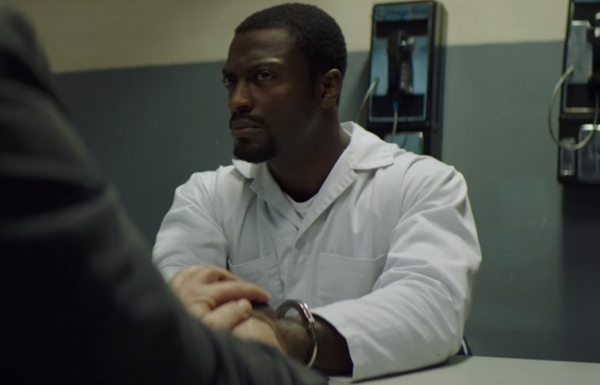![]()
Newcomer Chinonye Chukwu’s breakthrough film “Clemency” made a splash at the 2019 Sundance Festival and it’s a solid, well-intentioned drama, substantially elevated by the performances of Aldis Hodge and particularly Alfre Woodard. While blighted by a preachy screenplay that bluntly broadcasts its social messages, the film still manages to tell an affecting story about the relationshop between a prison warden, who has to carry out her duties, and a black convict who faces execution. The film could have been far peachier than what it becomes: a muted and austere message movie that examines and observes rather than lectures.
Written and directed by Chukwu, and while an independent film made outside the Hollywood system, the film still belongs to the conventional Hollywood socially-conscious melodramas that we have been acquainted with over the years by such great films as Marc Forster’s “Monster’s Ball” and Tim Robbin’s “Dead Man Walking”. We are now living in a time where studios take very few risks 0n movies about serious issues with larger budgets and bigger stars unless it’s an awards-season movie that is built to earn Oscar buzz like “Green Book” or “Just Mercy”. In this film, Chukwu’s vision is noble and earnest–she has crafted an earnest drama that proliferates redemption without being too cloying about it, and while staying blunt in its stand on capital punishment. The film offers numerous greatly acted moments that do feel overwritten in some areas, but muted on many other levels. It is Chukwu’s directing skills and use of silence that work best, rather than her plotting and overwritten dialogue.
The film focuses on Bernadine Williams (Woodard), a warden of a high-security prison. Bernadine has led the command over dozens of executions, and another execution is about to be scheduled–that of a young, emotionally scarred, and remorseful convict named Anthony Woods (Hodge), who’s been on death row for quite a few years. Anthony is a convicted criminal, who claims he didn’t kill a police officer, and some evidence validates his plight. Meanwhile his appeals continue to be denied, and his last hope remains a clemency to the state governor. This leaves Warden Williams in a conflicting situation wherein she does everything she can to grant clemency to Anthony, and to prolong his stay of execution. She always prevents the execution from turning into a media frenzy, and is very inflexible about protocol and regulations.
Bernadine is obedient to her duties, and never shows any sort of emotion or offers any opinions. Her line of work also puts her marriage to her husband Jonathan (Wendell Pierce) in turmoil, who feels she is putting work over everything else. Meanwhile, Anthony is very distraught about his pending execution; he has given up all hopes of being acquitted. He has nobody to turn to other than his anti-death penalty activist lawyer Marty (Richard Shiff). To make matters worse, Anthony also has to contend with the grieving relatives of the dead cop he was charged in killing, along with an estranged ex-girlfriend named Evette (Danielle Brooks) who unleashes a lot of anguish towards him in one of the films most dynamic and richest moments.
The success of the film rests in how Chukwu builds great empathy, not only with Anthony’s torment, but with Warden Williams’ duties. She is in a very stressful and complicated situation that is going to leave one party hurt over the other. It’s very commanding in how Chukwu searches these emotional truths, showing how people working within the prison system succumb to stress and other emotional hardships. Just because the state is forcing out the acts, and people are carrying out the laws, doesn’t mean the people carrying out the acts aren’t haunted or impacted by their complicity. Even though lethal injection is thought of as being far less cruel than the electric chair execution, it only takes one procedure to go awry, and that will only bring stress and hardships on the practitioners carrying out the law. This is where the film’s strengths lie, and it is commanding how the film takes a more measured approach than what it might have in lesser hands.
Chukwu also avoids the tiresome clichés of racist alpha males dominating over the inmates. There are no scenes of inmate violence and prison brawls, there isn’t the “savior” style trope that we often see in these films. There is certainly redemption to be found, especially in the last few minutes, but it all feels earned and raw. The drama is very slow-burn in this film; at times it undermines the overall pacing of the story, which certainly feels pokey at times. All around the film plays out very sophisticated and emotionally cogent. Woodward delivers one of the most understated and equally raw performances of the year. She delivers great emotional weight that elevates the film into a terrain of a successful character study. She is a professional warden who is likable, but who lives a contradictory and conflicted life and is confined to a deep moral and professional conundrum.
The film’s ending leaves the final outcome on a wrenching note: the viewer is forced to observe Warden Williams’ discomfort and the emotional dissonance she can no longer suppress. It’s almost as if her soul needs to be pardoned from her career. The performance by Woodard is truly powerful here, and this moment is a great choice by Chukwu , empathizing with whatever outcomes occur; we are trapped from the circumstances. “Clemency” is one of the rare films that captures those hard lessons.











Where is this playing?
It expands nationwide on January 24th 🙂
Saw it earlier at the Angelika Film Center in NYC, found the film to be very dry and drawn out to be honest. Though I did love that final scene. I am eagerly awaiting your top ten lists of the year.
I’m not sure why but this weblog is loading very slow for me.
Is anyone else having this problem or is it a problem on my end?
I’ll check back later and see if the problem still
exists.
Do you have a spam issue on this website; I also am a blogger, and I was wondering
your situation; many of us have created some
nice methods and we are looking to exchange techniques with
others, please shoot me an email if interested. adreamoftrains hosting services
I was very pleased to uncover this great site.
I need to to thank you for your time just for this wonderful read!!
I definitely savored every bit of it and I have you saved
to fav to see new stuff in your web site.
You are so awesome! I don’t suppose I’ve read anything like that before.
So nice to discover somebody with genuine thoughts on this subject matter.
Seriously.. thanks for starting this up. This web site is one thing that’s needed on the web, someone with a little originality!
Hey there! I’ve been reading your blog for a long time now and finally got the bravery to go ahead and give you a shout out from Lubbock Tx! Just wanted to say keep up the great work!|
Thanks a bunch for sharing this with all people you actually understand what you are talking approximately! Bookmarked. Kindly additionally visit my web site =). We can have a hyperlink alternate arrangement among us|
Howdy! This blog post could not be written any better! Reading through this post reminds me of my previous roommate! He always kept talking about this. I will forward this article to him. Fairly certain he will have a great read. Many thanks for sharing!|
Thanks again for the blog article.Thanks Again. Really Cool.
Really appreciate you sharing this article post. Cool.
Thank you, I have recently been looking for information about this subject for ages and yours is the best I have came upon sofar. However, what about the conclusion? Are you positivein regards to the source?